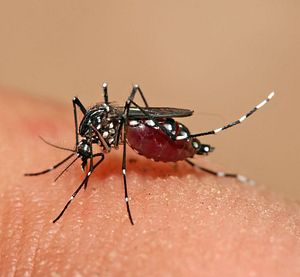It’s officially an epidemic, the Philippines declared this week as dengue cases skyrocket. A huge 146,062 cases of the tropical disease have been recorded from January to late July this year, up 98 percent for the same period a year ago. At least 622 people have died in recent months and those numbers are expected to climb as a response rolls out nation-wide. But with the Dengvaxia scandal specter still looming large over the country’s public health agencies, this latest epidemic may prove even harder to resolve.
The Dengvaxia scandal still remains fresh in the memory of those familiar with health issues in the Philippines. French pharmaceutical firm Sanofi Pasteur met with former president Benigno Aquino III in 2015, agreeing that the Philippines would be the first country in Asia to roll-out the mass Dengvaxia vaccination program. The program cost the country $67 million and 800,000 children had been immunized before devastating cracks began to appear. By December 2017, new research provided by Sanofi found the vaccine could worsen dengue in recipients who had not previously contracted the disease. The Department of Health pulled the plug and linked at least 10 deaths, including children, to the vaccine.
Political and public health fallout to the controversy has been severe. Aquino and allies continue to face allegations of corruption for implementing the program. Aquino has denied the charges and says mass chaos was caused by his detractors and bumbling public health officials. “The protection that could have been given to a lot of people was not given… It is like scandal and alarm. If there are people who were killed, they should be held liable,” he said in Manila following the outbreak announcement.
The Dengvaxia controversy’s impact on public health beyond dengue is already being felt. Trust in the system has collapsed and an anti-vaccination movement has taken off, causing a measles outbreak this year. The World Health Organization points directly to the Dengvaxia case. The Philippines has lost ground on measles vaccines from 80 percent in 2008 to dropping below 70 percent in 2017 at the height of the Dengvaxia scandal. Worryingly, a survey from the London School of Hygiene and Tropical Medicine shows faith that “that vaccines are important, are safe and are effective” has dropped to between 60 and 80 percent in 2018, down from near 100 percent in 2015.
In the face of the newest epidemic, President Rodrigo Duterte briefly suggested bringing back Dengvaxia. While the vaccine is commercially available now throughout countries in Southeast Asia, including hotspots Thailand and Indonesia, similar problems with seronegative patients persist. Still, Malacanang has floated the idea of a vaccine program for those who have previously had dengue.
“The problem is how do we know if one had dengue or not? We need to have a test. If we have that, there’s no problem. We can use that for those who have contracted dengue,” presidential spokesman Salvador Panelo said this week. His comments highlight how widespread the outbreak is and how difficult it is to effectively monitor and treat outbreaks in rural areas of the archipelago.
Health Secretary Francisco Duque is not going to entertain the return of Dengvaxia. He says that it’s Filipino children between the ages of 5 and 9 which are most at risk of serious illness during this outbreak. And with Dengvaxia recommended for 9-years-old and up, bringing back the vaccine is a very big headache with little payoff.
He added that it’s also not a cost-effective response to such a widespread outbreak. Instead, the department of health will focus on tried measures including the identification and smogging of mosquito areas, distributing nets and recommending full coverage clothing. But, with the department swamped by serious allegations of misuse of funds and general mismanagement, it may prove difficult to trust the agencies the Philippines now needs the most.

































